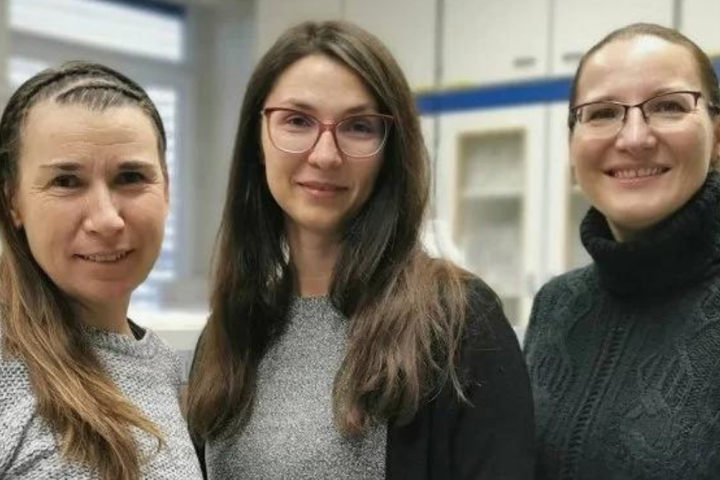News
Customize list
-

New method for predicting adult height
Researchers from Jožef Stefan Institute and Faculty of Sport, University of Ljubljana, developed a new method for predicting adult height of children and adolescents. The method uses large population data collected in the framework of the SLOfit program over decades. It compares the growth curve of a child with those of the most similar individuals and substantially outperforms the existing height predicting methods.
-

Hydrodynamic cavitation can be used to inactivate enveloped viruses
Researchers from the Faculty of Mechanical Engineering at the University of Ljubljana, led by Prof. Dr. Matevž Dular, have shown in an experimental study that the phi6 virus, which belongs to the viruses with a lipid envelope, can be successfully inactivated using hydrodynamic cavitation. The study is significant in that it shows that hydrodynamic cavitation has the potential to inactivate pathogenic enveloped viruses in water under ambient conditions. Although the primary mode of transmission for enveloped viruses is not water, the recent pandemic has reminded us that we need to be prepared for the worst, given the possibility of the emergence of enveloped viruses or virus strains that can be transmitted through water in the future.
-

Using cavitation to break down invisible water pollutants
Researchers from the Faculty of Mechanical Engineering and the National Institute of Chemistry conducted an experimental study in which they achieved the degradation of a water-soluble synthetic polymer - poly(vinyl alcohol) PVOH - by acoustic and hydrodynamic cavitation. The use of PVOH is rapidly increasing, and as a result, increasing amounts of this material are being released into the environment. PVOH is widely used in the textile and paper industries, as well as in households, for example in the form of detergent pods. It is estimated that thousands of tons of it are washed into the aquatic ecosystem every year.
-

Chronic disease risk prediction with artificial intelligence
Project SmartCHANGE - an innovative solution for drastically reducing the risk of chronic non-communicable diseases.
Although the future may seem like something we can only speculate about, the Jožef Stefan Institute, in collaboration with the SLOfit research group of the Faculty of Sport of the University of Ljubljana, within the Horizon Europe program, is starting to develop an innovative solution that would enable better prediction and drastic reduction of the risk of developing chronic non-communicable diseases (NCDs; e.g. cardiovascular and metabolic diseases, various forms of cancer) with the help of artificial intelligence. -

New method for treating the cardiac arrhythmias through electroporation
Slovenian scientists have contributed significantly to the development of treating heart arrhythmia using electroporation. This involves a procedure of ablation of the heart muscle with high-voltage electric pulses, in which researchers from the Faculty of Electrical Engineering of the University of Ljubljana under the leadership of Professor Damijan Miklavčič are collaborating with the American company Medtronic, one of the leading medical equipment companies in the world. The results of the clinical study were presented at the beginning of March by Dr. Atul Verma, head of clinical research at McGill University in Montreal, Canada, at the congress of the American College of Cardiology in New Orleans, USA.
-

Prof. Mirjam Mencej has won a prominent ERC Advanced grant project
Prof. Mirjam Mencej, PhD, from the Department of Ethnology and Cultural Anthropology at the University of Ljubljana's Faculty of Arts has won the European Research Council (ERC) Advanced Grant for established researchers for the project "The roles of the agency of the dead in the lives of individuals in contemporary society (DEAGENCY)". The project, worth almost EUR 2 million, will run for five years, starting on 1 September 2023.
-

Reintroduction of the Healthy Lifestyle Intervention could radically boost the post-corona recovery of capacities in Slovenian youth
A newly published study by the SLOfit group at the Faculty of Sport of the University of Ljubljana has shown that interventions for increasing physical activity, such as the Healthy Lifestyle Intervention in Slovenian schools, are vital for preventing childhood obesity in developed countries.
-

Slovenian project SLOfit is the E+ SPORT #BeActive Across Generations Award Winner 2022
The SLOfit project - Lifelong monitoring of physical fitness, developed at the Faculty of Sport University Ljubljana, was selected by an expert jury in Brussels as the winner of the E+ SPORT #BeActive - Across Generations Award 2022, dedicated to recognizing the best European projects that promote a regular exercise and ensure easier access to sport and physical activity for all generations.
-

University of Ljubljana participates in ground-breaking research proving the advantages of prescribing medication based on genetic code
The research findings of an international group from seven countries, headed by researchers from Leiden University Medical Centre (LUMC), and involving the participation of researchers from the Faculty of Medicine of the University of Ljubljana, show that patients experience as much as 30% fewer serious adverse side effects of medication if the choice of medicines is adapted to their genetic code. The study, which was published in medical journal The Lancet, is the first to demonstrate the advantages of prescribing medication from various therapeutic groups based on the genetic code of the individual patient.
-

SIMBA innovation in the fight against superbacteria
Innovation offers faster and cheaper solution in finding new active substances in the fight against superbacteria
The growing phenomenon of superbacteria, as we call bacteria that are resistant to multiple antibiotics, is a global health problem. The problem is exacerbated by the merging of bacteria in biofilms, which offers them protection and survival in very harsh conditions and facilitates the transmission of resistance. For this very reason the global development of new antibiotics is focused on their effects on other properties of the bacteria, such as attaching bacteria to the surface, movement or interaction between bacteria, and not just on survival. The new orientation of development urgently requires a new methodology.
